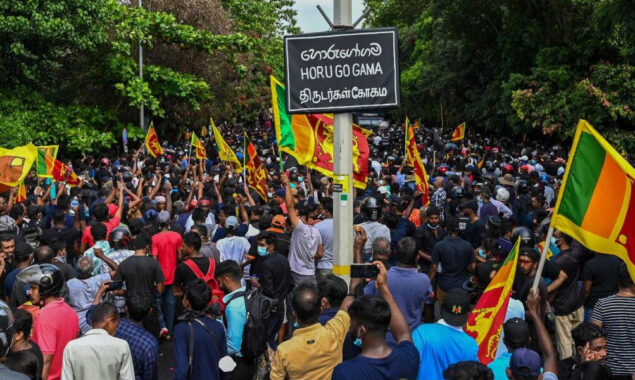
Diplomats urge Sri Lanka to reconsider state of emergency
US and European officials urged Sri Lanka’s embattled president on Saturday to lift the rule of emergency declared after a mass strike brought the insolvent country to a halt.
Months of blackouts and severe food, gasoline, and medical shortages have wreaked havoc on the South Asian island nation, which is experiencing its worst-ever economic collapse.
After weeks of rallies demanding his government resign for its mishandling of the issue, President Gotabaya Rajapaksa proclaimed a new state of emergency on Friday.
The second declaration of emergency in as many months has disturbed US Ambassador Julie Chung, who added that Sri Lanka’s increasing economic crises and political deadlock need long-term solutions.
“The State of Emergency won’t help do that,” Chung said on Twitter.
The European Union said the ordinance “could have a counterproductive effect” and noted that a month of anti-government protests had so far been peaceful.
After Friday’s countrywide strike halted public transportation and economic activities, Rajapaksa’s spokesman stated the state of emergency was implemented to “maintain public order.”
The bill provides the military broad detention powers and permits the president to establish laws without parliamentary approval.
On April 1, Rajapaksa proclaimed a state of emergency, a day after tens of thousands of demonstrators attempted to storm his home in Colombo.
Days later, it was allowed to expire, but protests have since increased and spread over the island.
For nearly a month, thousands have gathered outside Rajapaksa’s oceanfront office to demand his resignation.
Police fired a barrage of tear gas and water cannon on Friday in an effort to disperse student protesters who were blockading parliament.
– Political instability –
The government said in a Saturday statement that Sri Lanka was facing its “worst economic crisis and political instability ever”.
“The state of emergency was declared to ensure political stability which is a vital condition in overcoming the current socio-economic crisis,” the statement added.
The emergency declaration is a blow to Sri Lanka’s vital tourism industry, which had been making a slow recovery after it was crippled by the coronavirus pandemic.
“Tour operators are going to be reluctant because the emergency also means higher insurance premiums applicable to trouble spots,” a Colombo hotel manager told AFP.
According to government sources, the president may ask his brother, Prime Minister Mahinda Rajapaksa, to resign in order to pave the way for a unity government to guide Sri Lanka through the crisis.
However, Sri Lanka’s major opposition party has stated that it will not join any administration led by a Rajapaksa family member.
Sri Lanka’s economic problems began when the pandemic decimated tourism and remittance revenues.
Utility firms have imposed daily blackouts to ration electricity due to a shortage of funds, while huge queues of people snake around service stations for petrol and kerosene.
Hospitals are running low on essential medicines, prompting the government to ask for donations from residents around the world.
Sri Lanka declared default on its $51 billion foreign debt last month.
This Monday, Finance Minister Ali Sabry warned that the country would face unprecedented economic suffering for at least the next two years.
Read More News On
Catch all the International News, Breaking News Event and Latest News Updates on The BOL News
Download The BOL News App to get the Daily News Update & Follow us on Google News.




